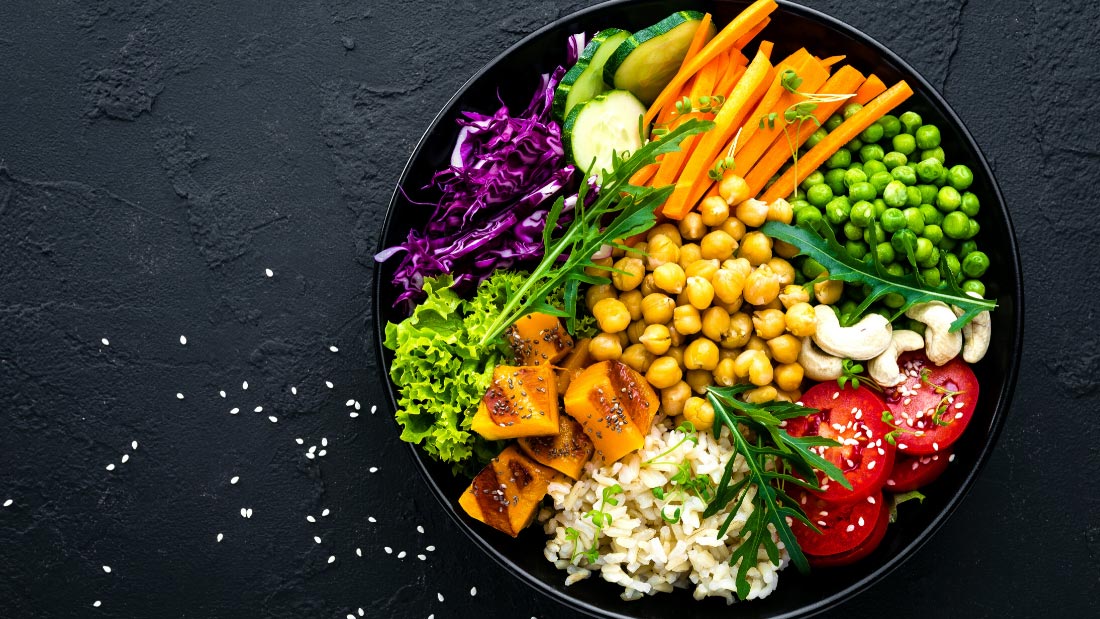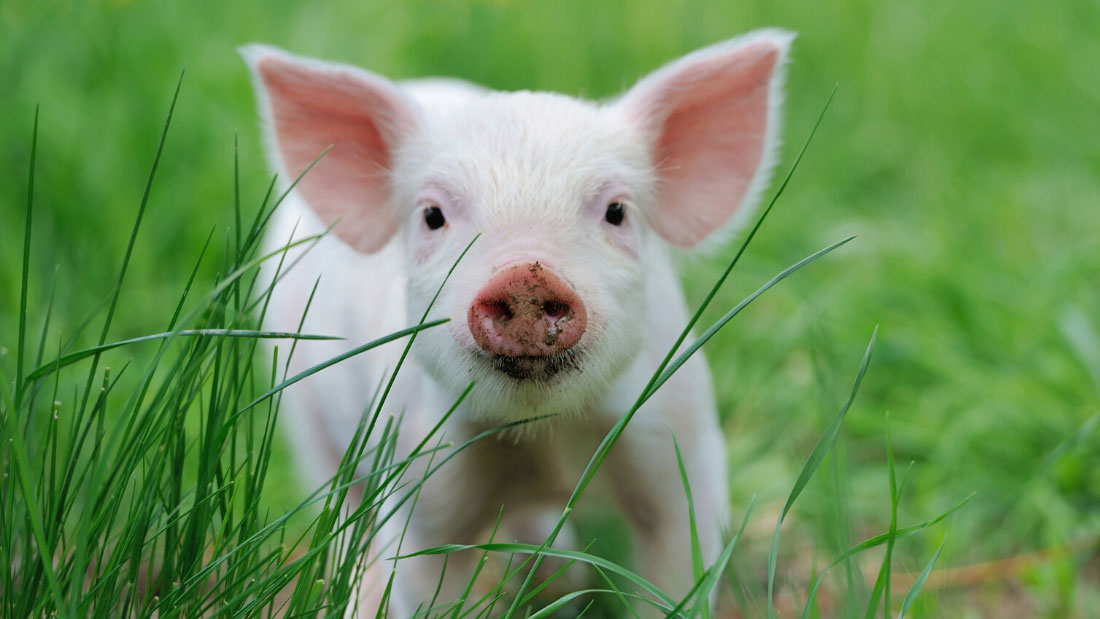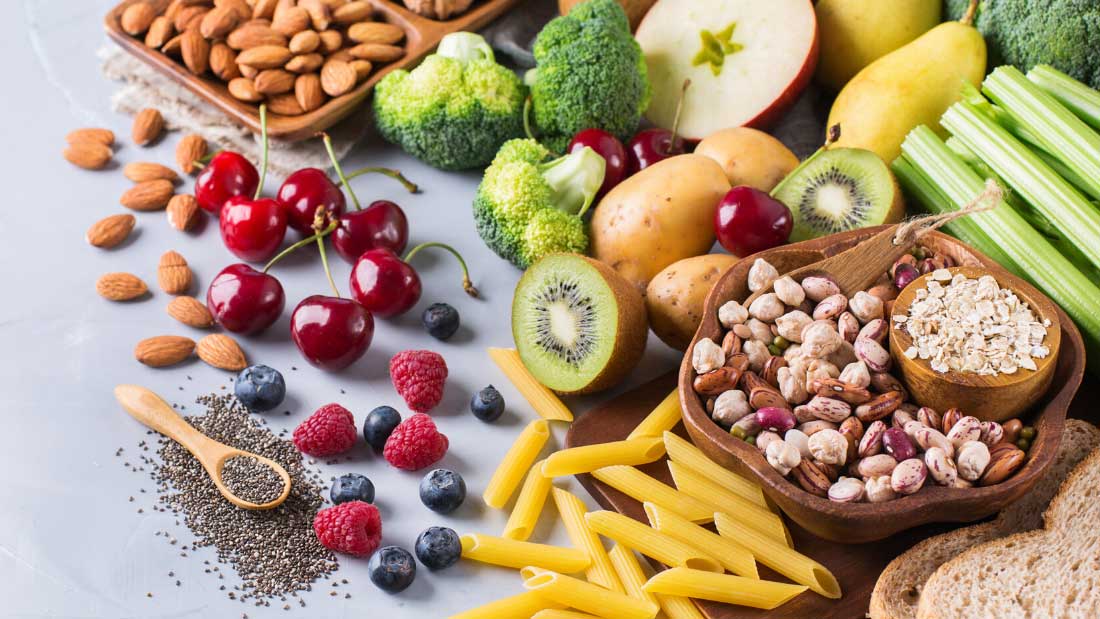Statistics about veganism

Survey results over recent years show the number of people ditching meat is on the rise. The increasing number of people opting for a compassionate lifestyle is reflected in the huge rise in the number of vegan options available from supermarkets, restaurants, cafés and online shops.
But don’t just take our word for it! Check out the latest facts and figures below. We also have pages dedicated to statistics about factory farming and slaughter in our animals section.
- Surveys show that many people are adopting diets with less animal products, with younger people leading the way.
- Between 2014 and 2019 there was a steep rise as the number of UK vegans quadrupled.
- In 2024, comparison website Finder said that there were an estimated 2.5 million vegans in the UK (4.7 per cent of the adult population). This is an increase on previous numbers which suggested two to four per cent of UK consumers are vegan.
- Other surveys suggest half of the UK population are cutting down – or cutting out – meat.
- Research carried out by Ipsos reveals that almost half (46 per cent) of Brits aged 16 to 75 are considering reducing their intake of animal products in the future.
- 63 per cent of Britain’s vegans have adopted the lifestyle in the past five years. However, 81 per cent of them were previously vegetarian, so many have been avoiding meat for much longer than this.
- 70 per cent of those surveyed went vegan because of animal-welfare concerns (80 per cent said they thought the way animals are farmed and killed is cruel), 53 per cent had environmental concerns and 27 per cent said personal health was also one of the reasons for going vegan.

It is difficult to find accurate data about how many vegans there are in the world. A survey conducted by Ipsos in 2018 estimated that vegans make up three per cent of the global population – over 230 million people. The Guardian has a more conservative estimate at 79 million people (one per cent).
- A survey from Berlin-based Veganz ranked five European countries by the number of vegans and the UK was top of the list with 3.2 per cent of people. Italy ranked second with 2.3 per cent, closely followed by Germany and Austria, both with 2.2 per cent, then Spain with 2.1 per cent and France at just 2.0 per cent. The vegans in these five countries alone number more than five million in total.
- In the US, around two per cent of people are vegan but many more are reducing their meat intake. The Alliance for Science estimate that one in 10 Americans don’t eat meat and research conducted by One Poll in 2021, found that nearly one in every two Americans consumes more plant-based meals than meat, with 54 per cent of those aged 24 to 39 identifying as flexitarian.
- In Australia, 42 per cent of people reported eating less meat or none at all in 2019. Among them, 20 per cent as flexitarians, 12 per cent as meat-reducers and 10 per cent as vegan or vegetarian.
- India has significantly higher levels of vegetarian and vegan diets; 22 per cent follow a vegetarian diet and 19 per cent are vegan.
- In Brazil, China and Mexico between one and two per cent of people are vegan.
- In Canada 850,000 (2.3 per cent) were vegan in 2018, but people under 35 are three times more likely than older Canadians to be vegan, suggesting big changes in dietary habits are on the horizon.

UK surveys show that younger adults are more likely to be vegan; the demographic group in Britain most commonly adhering to a vegan diet is women aged 18 to 34. This finding is consistent with results from other countries. So, the number of vegans is likely to continue to grow, as younger people pass their diets down to their children.
In 2024, comparison website Finder questioned 2,000 Brits (with representative quotas for gender, age and region) and found that there are an estimated 2.5 million vegans in the UK (4.7 per cent of the adult population). They said the number of UK vegans has risen by an estimated 1.1 million between 2023 and 2024. They also said there are 3.1 million vegetarians (5.8 per cent) and around three million pescatarians (5.7 per cent), making a total of 8.6 million people following a meat-free diet (16.2 per cent of UK adults). They did not estimate how many people are plant-based or flexitarian but did say an estimated 6.4 million Brits plan to adopt a meat-free diet in 2024. If everyone who planned to cut meat out did so, a total of 15 million people would be meat-free at the beginning of 2025, which is 28 per cent of the adult population.
Market research and data analytics firm YouGov’s biannual tracker also surveys around 2,000 UK consumers twice a year. In January 2024, their survey suggested two per cent of UK consumers are vegan, five per cent are vegetarian and three per cent are fish-eaters. A further 13 per cent, they say, are flexitarian or mostly plant-based.
Consumer and market data specialists Statista, on the other hand, surveyed over 4,000 UK adults in 2024 and found that around three per cent of UK consumers are vegan, seven per cent are vegetarian and four per cent are fish-eaters. They also estimate that a further 13 per cent are flexitarian or mostly plant-based.
| YouGov 2023 | Statista 2024 | Finder 2024 | ||||
| % of adult population | Millions* | % of adult population | Million* | % of adult population | Million | |
| Vegan | 2 | 1.20 | 3 | 1.65 | 4.7 | 2.5 |
| Vegetarian | 5 | 2.75 | 7 | 3.85 | 5.8 | 3.1 |
| Pescatarian | 3 | 1.65 | 4 | 2.20 | 5.7 | 3.0 |
| TOTAL meat-free | 10 | 5.50 | 14 | 7.70 | 16.2 | 8.83 |
| Flexitarian/plant-based | 13 | 7.15 | 13 | 7.15 | – | – |
*based on the ONS estimate of 55 million adults in the UK population in 2023.
So, around six to nine million adult UK consumers don’t eat meat a further seven million rarely eat it and over six million are planning to go meat-free.
Whichever survey you look at, there is a huge increase in the demand for plant-based and vegan foods:
- The global food market provides a good indication of how veganism is exploding around the world. In 2021, the global vegan food market was close to 16 billion US dollars. It is expected to reach a value of over 24 billion by 2026.
- According to market research company Meticulous Research, the plant-based food market in Europe is expected to grow by 10 per cent a year from 2022 to 2029, to reach 16.7 billion US dollars by 2029 – more than the entire global vegan food market in 2021! Among the key players, they say, are: Beyond Meat, Taifun, Vbites, Plamil Foods, The Meatless Farm and Veganz but many more are joining in the vegan bonanza!
- Around 80 per cent of the top meat producers are now making vegan food – if you can’t beat ‘em, join ‘em!
- According to Mintel, in 2019, the UK became the world leader for vegan product launches.
Some other interesting statistics include:
- In Australia, nearly one in 10 new food products on supermarket shelves is labelled as vegan or containing no animal products. It’s the same picture across Europe.
- According to the Sainsbury’s Future of Food report, vegetarians and vegans will make up a quarter of the population by 2025. They reported a 24 per cent increase in customers searching for vegan products online and a 65 per cent increase in sales of plant-based products year-on-year.
- Each year, the number of sign-ups for the Veganuary campaign increases, more than 620,000 people from 220 countries and territories took part in Veganuary 2022 breaking all previous records. A total of two million people have officially signed up since the pledge began in 2014.
- Vegan takeaway orders quadrupled between 2016 and 2018, becoming the fastest growing takeaway choice. In 2021, Deliveroo said that orders of vegan dishes were up 163 per cent on the previous year.
- Google searches related to ‘veganism’ have increased significantly year-on-year, according to Google trends. In 2022, the countries showing the most interest included: the UK, Australia, New Zealand, Israel, Germany, Austria, Sweden, Canada, Switzerland and the US.
- The number of vegan books available from Waterstones increased from 994 books in August 2018 to over 10,000 in July 2022.
- Research from Linda McCartney Foods found that 70 per cent of British children want to see more vegan and veggie meals on their school menu. The main motivations include being ‘kinder to animals’ (44 per cent), fear for the environment (31 per cent) and being healthier (29 per cent).
- Dozens of companies around the world are developing cultured chicken, beef, pork and fish. The FAIRR Initiative say that in 2021, 506 million US dollars was invested in lab-grown meat. By 2035, cultured meat, along with plant foods and mycoprotein, such as Quorn, will make up 11 per cent of protein sources compared to just two per cent in 2020.
- Law firm EMW say there was a 128 per cent surge in new trademarks registered for vegan food in the UK, with 107 trademarks registered in 2019, up from just 47 in 2018 – with multinational businesses competing.

Obviously, yes! Billions of animals endure terrible suffering every year for food and dairy so by going vegan you are making a stand against this injustice.
Globally more than 80 billion land animals are farmed for their meat, milk, and eggs every year.
Globally, trillions of wild fish, farmed fish and shellfish are killed every year.
There are at least 20 billion chickens alive in the world at any one time – that’s almost three times the number of humans.
Tens of billions of animals endure short, miserable lives in factory farms where the priority is profit above all else.
Every year, over one billion chickens, 12 million turkeys, 13 million sheep and lambs, 10 million pigs, 2.7 million cows and 10 million ducks and geese are slaughtered in the UK for human consumption.
Every year up to 2.7 billion wild fish, 77 million farmed fish and 4.4 billion shellfish are slaughtered in the UK for human consumption. These numbers do not include bycatch.

A huge body of evidence supports a global shift to vegan diets to save the planet. Here are some of the highlights taken from our Envirocidal report.
75% of the world’s agricultural land is used for raising animals – this includes animal feed, pasture and grazing.
Foley J. A. et al. 2011. Solutions for a cultivated planet. Nature.
Agriculture is the single biggest cause of air pollution in europe, contributing more than residential energy use or power generation.
Lelieveld, J. et al. 2015. The contribution of outdoor air pollution sources to premature mortality on a global scale. Nature.
Meat, fish, eggs and dairy use around 83% of the world’s farmland and contribute 56-58% of food’s different emissions but only provide 37% of the protein we eat and 18% of calories.
Poore, J and Nemecek, T. 2018. Reducing food’s environmental impacts through producers and consumers. Science.
Livestock production is responsible for 70% of global freshwater consumption.
In the amazon rainforest, 80% of deforested land is used for cattle grazing.
Veiga J.B., et al. 2002. Cattle ranching in the Amazon rainforest. Animal Production Sciences.
If we continue at the same rate, 88% of our fishing stocks will be overfished by 2050.
Worm B. 2016. Averting a global fisheries disaster. Proceedings of the National Academy of Sciences.
One in nine people in the world today are undernourished, yet around a third of the world’s cereal harvest is fed to animals.
Government Office for Science. 2011. Foresight Project on Global Food and Farming Futures Synthesis Report.
If the world went vegan, it could save up to 8 million lives by 2050, reduce greenhouse gas emissions by two thirds, and could lead to health-care related savings and avoided climate damages of $1.5 trillion.
Vegan diets result in 76% less land use and 50% less greenhouse gas emissions.
Government Office for Science. 2011. Foresight Project on Global Food and Farming Futures Synthesis Report.
Reducing animal products in the diet could save enough water for 1.8 billion people.
Jalava, M. et al. 2014. Diet change – a solution to reduce water use? Environmental Research Letters.
Download Environment Infographic

The short answer is – yes! We have detailed information in our Incredible Vegan Health Report. Here’s a snapshot:
Plant-based foods, are more protective than animal food groups against chronic diet-related diseases such as obesity, diabetes, heart disease, kidney and liver disorders and cancers.
Fardet, A. and Boirie, Y. 2014. Associations between food and beverage groups and major diet-related chronic diseases: an exhaustive review of pooled/meta-analyses and systematic reviews. Nutrition Reviews.
Vegans have the healthiest weight among all dietary groups and received the highest score on the healthy eating scale.
Clarys, P. et al. 2014. Comparison of nutritional quality of the vegan, vegetarian, semi-vegetarian, pesco-vegetarian and omnivorous diet. Nutrients.
Vegans have more than sufficient intakes of protein, vitamins and minerals – including calcium and iron – above recommended intakes.
Rizzo, N.S. et al. 2013. Nutrient profiles of vegetarian and nonvegetarian dietary patterns. Journal of the Academy of Nutrition and Dietetics.
Vegans have the highest intake of fibre and the lowest intake of fat.
Rizzo, N.S. et al. 2013. Nutrient profiles of vegetarian and nonvegetarian dietary patterns. Journal of the Academy of Nutrition and Dietetics.
Key T.J. et al. 2014. Cancer in British vegetarians: updated analyses of 4998 incident cancers in a cohort of 32,491 meat eaters, 8612 fish eaters, 18,298 vegetarians, and 2246 vegans. American Journal of Clinical Nutrition.
Vegan diets are associated with lower risks of heart disease, high blood pressure, type 2 diabetes, obesity, certain cancers and lower cholesterol levels.
Garton L. 2014. Food Fact Sheet – Vegetarian Diets. British Dietetic Association.
Vegan diets have a cancer-protective effect as vegans have a considerably higher intake of foods and nutrients protective against cancer.
Craig W.J. 2009. Health effects of vegan diets. American Journal of Clinical Nutrition.
Compared to vegetarian diets (which include dairy and eggs), vegan diets offer greater protection from obesity, hypertension, type 2 diabetes and heart disease related mortality.
Le, L.T. and Sabaté, J. 2014. Beyond meatless, the health effects of vegan diets: findings from the Adventist cohorts. Nutrients.














